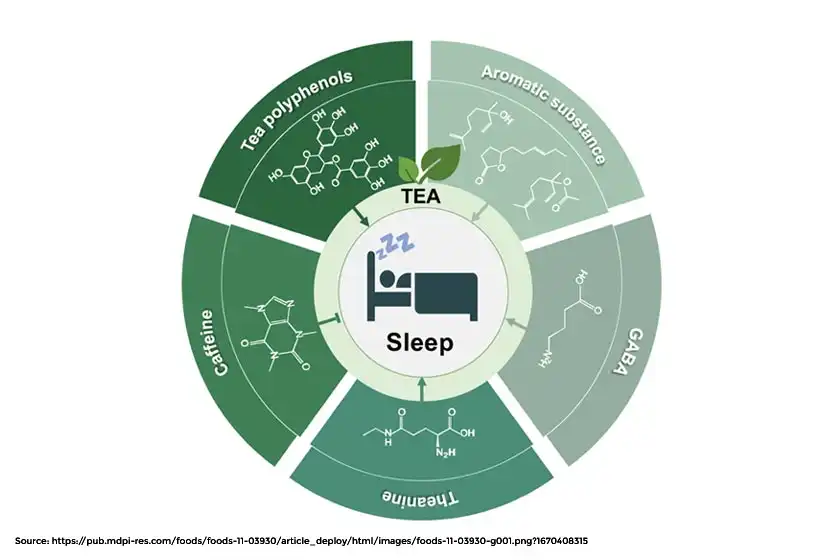Will Chamomile Tea Help You Sleep?

Do you often find it hard to fall asleep? You’re not alone.
In today’s fast-paced world, sleep problems have become increasingly common. As people seek natural ways to improve their rest, one remedy has gained widespread attention: Chamomile tea.
Does chamomile tea truly work as a sleep tea? Let’s find it today. We will explore the tradition behind the chamomile flower and how it compares to other herbs.
Find out whether chamomile tea truly deserves a place in your bedtime cup.
What is Chamomile Tea?
Chamomile tea is a herbal tea made from the dried chamomile flower. This golden-hued infusion is known for its delicate floral flavor and gentle, calming aroma. For centuries, chamomile tea has been celebrated for its ability to relax the body and soothe the mind.
The primary appeal of chamomile lies in its calming effects. It is a favorite among those looking to reduce anxiety or promote sleep.
Read about the link between sleep, anxiety, and depression.
Often referred to as a sleep tea, chamomile tea is typically consumed before bedtime. It is a part of a soothing nighttime ritual. Unlike traditional teas, chamomile is caffeine-free and is a good choice for late-evening sipping.
Whether enjoyed on its own or with other herbs, chamomile tea continues to be a staple in households.
Let’s look at how this tea helps with sleep!
How Chamomile Tea May Help With Sleep?
Chamomile tea contains several bioactive compounds. One of the most notable is apigenin, a powerful antioxidant. Apigenin binds to specific receptors in your brain, including GABA-A receptors. It is responsible for reducing neural activity. This action promotes drowsiness, reduces anxiety, and can help you fall asleep more easily.
Let’s look at how chamomile tea contributes to better sleep:
- Contains Apigenin: which is an antioxidant that acts on the brain’s receptors to produce a mild sedative effect.
- Reduces Anxiety: Chamomile has been shown to reduce symptoms of generalized anxiety disorder in some clinical trials.
- Promotes Relaxation: Sipping a warm cup of sleep tea can be part of a mindful nighttime routine, calming both the mind and body.
- Helps in Calming Rituals: Drinking chamomile before bed helps you to prepare for rest. This routine, paired with other healthy habits, supports a balanced sleep cycle.
By incorporating chamomile flowers into your bedtime routine, you can create a calming environment that supports natural, restful sleep.
Struggling to become a morning person? Discover simple bedtime routines.
Different Herbs and Flowers for Better Sleep
Chamomile may be one of the sleep-inducing herbs, however, it is not the only option. Nature provides many herbs and flowers known to calm the nervous system and enhance sleep. Here are some notable alternatives:
| Herb/Flower | Main Benefit | Best Form | Additional Effects |
|---|---|---|---|
| Kava | Deep relaxation, anxiety reduction | Tea, capsules | Muscle relaxation, mood-lifting |
| Passion Flower | Helps with insomnia and anxiety | Tea, tincture | Eases racing thoughts, supports GABA function |
| Clove | Warming, mild sedative | Tea, oil, and spice | Anti-inflammatory, digestive aid |
| Linden Tea | Calms the mind and body | Tea | Helps lower blood pressure, anxiety relief |
| Shroom Tea | Varies by mushroom; relaxation or energy | Tea | Immune boosting, cognitive support |
| Valerian | Sleep-inducing, reduces sleep latency | Valerian tea, capsules | May cause vivid dreams, very effective sedative |
| Hibiscus Flower | Promotes relaxation, regulates BP | Tea | High in antioxidants, heart-healthy |
| Blue Pea | Mildly calming, improves mood | Tea, extract | Enhances memory, antioxidant-rich |
Each of these herbs has unique compounds that impact the nervous system. For instance, valerian tea has sleep-promoting effects and is often paired with passion flower for synergistic results. Meanwhile, shroom tea (mushrooms) can help support deep rest.
Curious about natural ways to sleep better? Explore an in-depth review of herbal and natural supplements.
Let’s now discuss how sleep tea regulates the sleep cycle!
How Does Tea Regulate the Sleep Cycle?

The sleep cycle is a complex rhythm regulated by neurotransmitters and hormones. Certain compounds found in herbs and teas can positively influence these natural rhythms. Let’s break down how it works:
Tea Polyphenols
- These powerful antioxidants help reduce inflammation and oxidative stress.
- They may also influence the gut microbiome.
- It plays a role in sleep regulation.
Aromatic Substances
- Many herbs and teas contain volatile oils that have calming aromatic effects.
- These oils, such as those found in chamomile flowers and clove, can lower stress levels when inhaled or consumed.
GABA (Gamma-Aminobutyric Acid)
- This neurotransmitter inhibits overactive brain signals.
- Some sleep teas, like valerian and passion flower, may help the body increase GABA levels, promoting relaxation.
Theanine
- While commonly found in green tea, this amino acid promotes relaxation without drowsiness.
- It works synergistically with caffeine to reduce stress.
Caffeine
- While most herbs and herbal teas are naturally caffeine-free, it’s essential to double-check labels.
- Even trace amounts of caffeine in your nighttime sleep tea can delay the sleep cycle.
- That’s why caffeine-free chamomile tea is a top pick.
Together, these compounds help support the body’s natural circadian rhythms. A cup of herbal tea may not only help you fall asleep but may also support sleep maintenance and quality.
How Chamomile Tea Can Enhance the Sleep Cycle?
Chamomile tea is effective in enhancing the sleep cycle. It is due to its unique combination of flavonoids, volatile oils, and apigenin. By interacting with GABA receptors, it promotes a quicker transition from wakefulness to the early stages of sleep.
Additionally, chamomile tea:
- Encourages melatonin production by relaxing the body.
- Supports REM sleep, allowing for more restorative rest.
- Reduces nighttime awakenings by easing the nervous system.
To truly maximize the effects of chamomile tea, it’s essential to pair it with other sleep-friendly habits. One of the most impactful aspects of good sleep is your mattress. An uncomfortable or unsupportive mattress can sabotage even the best herbs.
A quality mattress complements your sleep tea ritual. To invest in a quality mattress, explore our mattress review page for the best options.
Smart Take
So, will chamomile tea help you sleep? The answer is yes for many people. With its naturally calming properties and rich antioxidant profile, chamomile flower offers an effective solution to modern sleep troubles.
However, don’t forget, great sleep isn’t just brewed in a teacup or having more herbs. It also starts with the right environment, and that includes your mattress. If your current mattress is leaving you tossing and turning, it might be time to upgrade.
Visit SmartMattressBuy to explore mattress reviews, sleep guides, price tracking tools, and hand-picked recommendations designed to help you sleep better.
Your best sleep starts with the perfect combination of a cup of chamomile and the right mattress.
